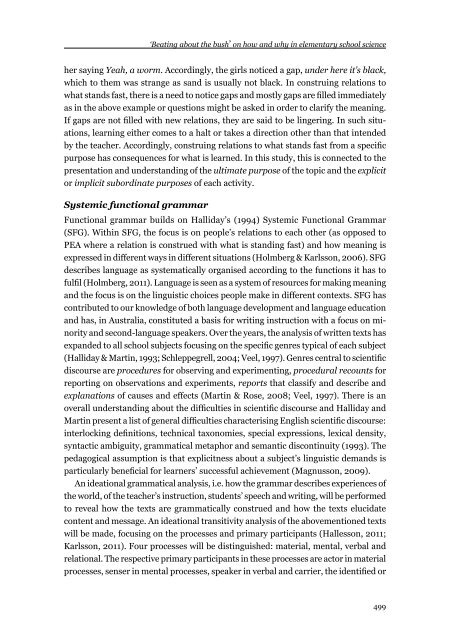Download issue - Lärarutbildning - Umeå universitet
Download issue - Lärarutbildning - Umeå universitet
Download issue - Lärarutbildning - Umeå universitet
You also want an ePaper? Increase the reach of your titles
YUMPU automatically turns print PDFs into web optimized ePapers that Google loves.
‘Beating about the bush’ on how and why in elementary school science<br />
her saying Yeah, a worm. Accordingly, the girls noticed a gap, under here it’s black,<br />
which to them was strange as sand is usually not black. In construing relations to<br />
what stands fast, there is a need to notice gaps and mostly gaps are filled immediately<br />
as in the above example or questions might be asked in order to clarify the meaning.<br />
If gaps are not filled with new relations, they are said to be lingering. In such situations,<br />
learning either comes to a halt or takes a direction other than that intended<br />
by the teacher. Accordingly, construing relations to what stands fast from a specific<br />
purpose has consequences for what is learned. In this study, this is connected to the<br />
presentation and understanding of the ultimate purpose of the topic and the explicit<br />
or implicit subordinate purposes of each activity.<br />
Systemic functional grammar<br />
Functional grammar builds on Halliday’s (1994) Systemic Functional Grammar<br />
(SFG). Within SFG, the focus is on people’s relations to each other (as opposed to<br />
PEA where a relation is construed with what is standing fast) and how meaning is<br />
expressed in different ways in different situations (Holmberg & Karlsson, 2006). SFG<br />
describes language as systematically organised according to the functions it has to<br />
fulfil (Holmberg, 2011). Language is seen as a system of resources for making meaning<br />
and the focus is on the linguistic choices people make in different contexts. SFG has<br />
contributed to our knowledge of both language development and language education<br />
and has, in Australia, constituted a basis for writing instruction with a focus on minority<br />
and second-language speakers. Over the years, the analysis of written texts has<br />
expanded to all school subjects focusing on the specific genres typical of each subject<br />
(Halliday & Martin, 1993; Schleppegrell, 2004; Veel, 1997). Genres central to scientific<br />
discourse are procedures for observing and experimenting, procedural recounts for<br />
reporting on observations and experiments, reports that classify and describe and<br />
explanations of causes and effects (Martin & Rose, 2008; Veel, 1997). There is an<br />
overall understanding about the difficulties in scientific discourse and Halliday and<br />
Martin present a list of general difficulties characterising English scientific discourse:<br />
interlocking definitions, technical taxonomies, special expressions, lexical density,<br />
syntactic ambiguity, grammatical metaphor and semantic discontinuity (1993). The<br />
pedagogical assumption is that explicitness about a subject’s linguistic demands is<br />
particularly beneficial for learners’ successful achievement (Magnusson, 2009).<br />
An ideational grammatical analysis, i.e. how the grammar describes experiences of<br />
the world, of the teacher’s instruction, students’ speech and writing, will be performed<br />
to reveal how the texts are grammatically construed and how the texts elucidate<br />
content and message. An ideational transitivity analysis of the abovementioned texts<br />
will be made, focusing on the processes and primary participants (Hallesson, 2011;<br />
Karlsson, 2011). Four processes will be distinguished: material, mental, verbal and<br />
relational. The respective primary participants in these processes are actor in material<br />
processes, senser in mental processes, speaker in verbal and carrier, the identified or<br />
499

















